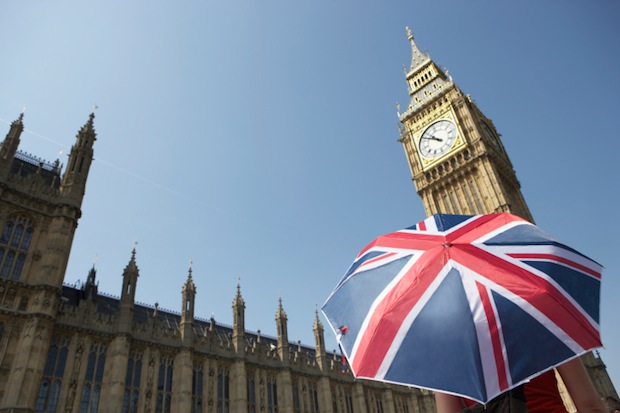In my late thirties, I have become patriotic. It’s one of those things that’s happened with age, like cooking to freeze, plumping cushions and thinking policemen look too young. My heart stirs at the sound of a marching band and at the thought of great British inventions: the London sewer system, steam engines, float glass. On the slimmest pretext I’ll start lamenting the decline of our great industries and tell you that too often our brightest ideas are developed abroad.
On most subjects, as we get older, my friends and I agree. On marriage and mortgages; grey hair and aching knees, but on Britain and its place in the world I am alone. Just a squeak from me in support of Britain, or British business, and my friends look taken aback, then almost appalled. It’s not just my friends, it’s their friends too — almost anyone my age I meet, and frankly I feel confused.
It happened again the weekend before last with my best and most beloved girl friends walking the Cleveland Way south to Whitby from Saltburn-by-the-Sea. We rustled through the rain dressed in plastic head to toe, past the whale-shapes of mud left behind by alum mines, down the potash steam-train tracks. Because of where we were, talk turned to industry.
Soon I found myself well under way. I had declared my conviction that the embers of British brilliance still burn under all the suffocating bureaucracy and was beginning on some of our most promising industries when I looked around. My friends’ heads had retreated deep inside their hoods, their faces tight with distaste. At Staithes, where James Cook first dreamed of setting sail, we had it out. I said: it’s exciting, Britain could be a contender! They said: but what’s so great about leading the world? Don’t we all compete too much? It’d be better if we just relaxed. One friend said Cameron was right to want to measure general wellbeing, not GDP. Another said Britain had had its day. We don’t need to be best; let other countries have a chance. The grey sea roared at my back, my woollen hat was solid with mizzle and I lost heart.
Late that night, in the Whitby youth hostel, I turned the matter over in my mind. These are bright, educated women, some left-wing, some right. They’re the sort who once would have manned the war effort and cracked codes, so what’s this will to decline? And forgive me, my friends, but isn’t it irresponsible? It’s easy to be sniffy about ‘economic growth’ when you’re not struggling to make ends meet. All around us, in Yorkshire and the north-east, the old industries have failed; in Middlesbrough, Darlington, Newcastle. Whitby was once a fishing town, built on shipbuilding and whaling, later jet-mining. These days it relies on tourism, and goths drawn to Dracula who hang out in the cliff-top church. But tourism’s a washy business, leaving ghost towns when the tourist tide goes out, and goths don’t exactly pay.
Unemployment in London may be falling but hereabouts it’s stubborn as a goat. The statistics tell a familiar story every month: jobs in the south but not in the north-east. Less than 2 per cent are on jobseekers’ allowance in the south-east, nearly three times that here. We slept that night surrounded by people longing for business; to compete. So why is ‘too much competition’ my generation’s cri de coeur?
Come morning, I had two answers, and one of them was guilt. My friends don’t all have easy lives by any stretch, but compared with jobseekers in the north-east, they’re well off. Guilt about their luck in life has shaped a reflex to be ‘nice’. They think workers should be liberated from unpleasant jobs; they show solidarity with the poor by despising ‘profit’.
We’re told so often of the evils of the empire and industry that it’s become natural to demur: oh, don’t worry, these days Britain knows its place. Those of us who are comfortable as a result of our forebears’ success perhaps feel this most sharply. Is there a sense also in which we feel that we’re now citizens of the world, that Whitby, less needy than Nairobi, can suck it up? I hope not. We must care for those nearest first, or become monsters.
The second problem is one of mental pictures — most arguments are over not facts but the images we conjure up. My friends, like many in government now, grew up in the late 1980s and 1990s, disgusted with greed and bling. Just the word ‘business’ gives them a picture of a life half-lived; of clone-fields of commuters seething over to Canary Wharf like soldiers off to perish for the sake of GDP. The word ‘profit’ provokes an image of some insufferable Tory lording it over serfs, or of oligarchs, or bankers earning out of all proportion to their skill. No wonder they wince.
My picture, the one I’d cram into their collective heads if I could, is of Rita Britton. Rita’s from Barnsley, south as the crow flies from Whitby, then west down the Humber. I met Rita by chance once, and I’ve thought of her often since. She’s a one-woman answer to my friends.
Rita was born in the 1940s and as a girl worked for a paper mill. Paper, linen, coal and glass made Barnsley great. She liked the mill, she said, but in the mid-1960s, aged 23 and mad on fashion, she saw a gap in the market. She called the designer Ossie Clark from a phone box and persuaded him to let her stock his clothes, took out a loan and opened Polly-anna, now Britain’s oldest independent fashion retailer, still cutting-edge and expanding all the time. There’s now a Pollyanna restaurant, a cafe, a gallery.
The point isn’t Rita’s success so much as her experience and her perspective. Rita’s a lifelong Labour supporter, working-class, in love with Barnsley and Britain too. Where the graceful decliners say Barnsley needs wellbeing, Rita says it urgently needs more jobs. Where they rail against cuts in benefits, Rita says welfare dependency is suffocating her town. Her beef with Miliband is that he’s going to make it harder to sack people, which would please most of my friends, but not Rita: it’ll kill off small business, she thinks, set us right back. She says: ‘Society is deteriorating and we’re not getting to grips with the real problems. I’ve voted Labour all my life, but I can’t stand political correctness. Political correctness is just a plaster.’
Got something to add? Join the discussion and comment below.
Get 10 issues for just $10
Subscribe to The Spectator Australia today for the next 10 magazine issues, plus full online access, for just $10.
You might disagree with half of it, but you’ll enjoy reading all of it. Try your first month for free, then just $2 a week for the remainder of your first year.















Comments
Don't miss out
Join the conversation with other Spectator Australia readers. Subscribe to leave a comment.
SUBSCRIBEAlready a subscriber? Log in